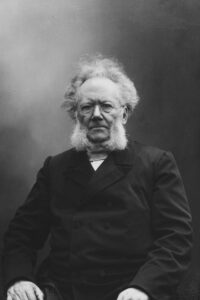
A Doll’s House
A room furnished comfortably and tastefully but not extravagantly. At the back, a door to the right leads to the entrance hall, and another to the left leads to Helmer’s study. Between the doors stands a piano. In the middle of the left-hand wall is a door, and beyond it a window. A round table, armchairs, and a small sofa are near the window. In the right-hand wall, at the farther end, another door; and on the same side, nearer the footlights, a stove, two easy chairs, and a rocking chair; between the stove and the door, a small table. Engravings on the walls; a cabinet with china and other small objects; a small bookcase with well-bound books. The floors are carpeted, and a fire burns in the stove. It is winter.
A bell rings in the hall; shortly afterward the door is heard to open. Enter NORA, humming a tune and in high spirits. She is in an outdoor dress and carries several parcels; these she lays on the table to the right. She leaves the outer door open after her, and through it is seen a PORTER who is carrying a Christmas Tree and a basket, which he gives to the MAID who has opened the door.)
Nora. Hide the Christmas Tree carefully, Helen. Be sure the children do not see it until this evening when it is dressed. (To the PORTER, taking out her purse.) How much?
Porter. Sixpence.
Nora. There is a shilling. No, keep the change. (The PORTER thanks her and goes out. NORA shuts the door. She is laughing to herself, as she takes off her hat and coat. She takes a packet of macaroons from her pocket and eats one or two; then goes cautiously to her husband’s door and listens.) Yes, he is in. (Still humming, she goes to the table on the right.)
Helmer (calls out from his room). Is that my little lark twittering out there?
Nora (busy opening some of the parcels). Yes, it is!
Read or download Book
Henrik Ibsen
Henrik Johan Ibsen ( 20 March 1828 – 23 May 1906) was a Norwegian playwright and theatre director.
Biography.
As one of the founders of modernism in theatre, Ibsen is often referred to as “the father of realism” and one of the most influential playwrights of his time, as well as one of the most influential playwrights in Western literature more generally. His major works include Brand, Peer Gynt, An Enemy of the People, Emperor and Galilean, A Doll’s House, Hedda Gabler, Ghosts, The Wild Duck, When We Dead Awaken, Rosmersholm, and The Master Builder. Ibsen is the most frequently performed dramatist in the world after Shakespeare, and A Doll’s House was the world’s most-performed play in 2006.
Ibsen’s early poetic and cinematic play Peer Gynt has strong surreal elements. After Peer Gynt Ibsen abandoned verse and wrote in realistic prose. Several of his later dramas were considered scandalous to many of his era when European theatre was expected to model strict morals of family life and propriety. Ibsen’s later work examined the realities that lay behind the façades, revealing much that was disquieting to a number of his contemporaries. He had a critical eye and conducted a free inquiry into the conditions of life and issues of morality. In many critics’ estimates, The Wild Duck and Rosmersholm are “vying with each other as rivals for the top place among Ibsen’s works”; Ibsen himself regarded Emperor Galilean as his masterpiece.
Ibsen is often ranked as one of the most distinguished playwrights in the European tradition and is widely regarded as the foremost playwright of the nineteenth century. He influenced other playwrights and novelists such as George Bernard Shaw, Oscar Wilde, Harley Granville Barker, Arthur Miller, Marguerite Yourcenar, James Joyce, Eugene O’Neill, and Jon Fosse. Ibsen was nominated for the Nobel Prize in Literature in 1902, 1903, and 1904.
Ibsen was born into the merchant elite of the port town of Skien and grew up as a member of the Ibsen–Paus extended family. Through the Paus family, Ibsen’s parents were raised as social “near-siblings.” Although most of Ibsen’s plays are set in Norway—often in places reminiscent of Skien—Ibsen lived for 27 years in Italy and Germany and rarely visited Norway during his most productive years. Ibsen’s dramas were informed by his background, and he often modeled or named characters after family members. Ibsen wrote his plays in Dano-Norwegian, and they were published by the Danish publisher Gyldendal. He was the father of Prime Minister Sigurd Ibsen.






